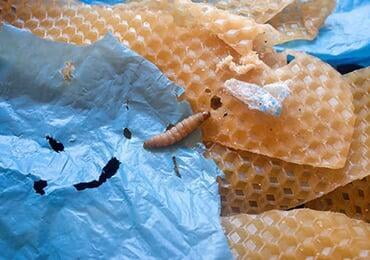Scientists have determined that enzymes in wax worm saliva can degrade plastic bags in a matter of hours.
Scientists in Spain have discovered that wax worms have the ability to degrade plastic bags in a matter of hours at room temperature. This could be an advance in the global fight against plastic pollution.
In 2017 Bertocchini of the Centre for Biological Research in Madrid, Spain, discovered that wax worms are capable of degrading polyethylene, although at the time it was unclear how these small insects did so. These parasites feed on beeswax, and to protect her hives from damage, Bertocchini puts plastic bags over them as protection.
In less than 40 minutes, the bags were riddled with holes. Plastic bags are made of polyethylene, which accounts for about 29 percent of the world's plastic consumption and is notoriously difficult to decompose.
The worms spent about 12 hours turning the material into a mess, raising some interesting possibilities, and follow-up experiments showed that the worms were actually digesting the plastic, rather than simply chewing it. But exactly how this process occurs remains a question, and scientists hope to identify the mechanism behind the worm's ability to swallow plastic. Which brings us to the new study published this week, led by Bertocchini and her team, which was published in the journal Nature Communications.

Scientists used electron microscopy to analyze the saliva of wax worms and traced their appetite for plastic to a pair of enzymes. Within a few hours at room temperature, these enzymes work together to produce visible pits on the surface of the plastic while oxidizing the material. By working together in this way, the team sees the pair as a new weapon in the fight against plastic degradation, and with a clear advantage over other enzymes enzymes possessing similar capabilities.
"For plastic to degrade, oxygen must penetrate the polymer (plastic molecules)," Bertocchini explained. "This is the first step in oxidation, usually the result of exposure to sunlight or high temperatures, and is the bottleneck that slows the degradation of plastics such as polyethylene, one of the most resistant polymers. This is why plastics take a long time to degrade under normal environmental conditions. These enzymes now found are the first and only known enzymes capable of degrading polyethylene plastic, able to oxidize and break down the polymer very quickly (after a few hours of exposure) without the need for pretreatment and working at room temperature."
First introduced in 1933, polyethylene is inexpensive, durable and does not interact with food, so it can be used for applications such as food packaging and grocery bags. The wax borer is the larvae of the wax borer, a species called the greater wax borer.
Considered a pest by beekeepers, the caterpillars feed on beeswax, pollen and honey, and occasionally on honeybee larvae. The idea is to synthesize the salivary enzymes that produce the worms, which the researchers have successfully done to break down plastic waste.
The scientists hope to carry out further work to reveal the mechanisms behind the enzyme's ability to degrade plastic. They note that much work remains to be done, but hope that the technology may one day help solve the growing problem of plastic pollution.
Bertocchini also said there are drawbacks to using billions of wax worms to do the job, including the production of carbon dioxide as they metabolize polyethylene.

